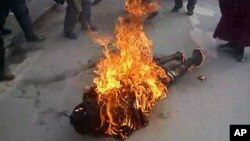United Nations human rights chief Navi Pillay is urging China to address the long-standing grievances that are prompting an alarming escalation of self-immolations by Tibetans. She says Tibetans are resorting to these desperate forms of protest because they see no other way out of their dilemma.
U.N. High Commissioner for Human Rights Navi Pillay says this wave of self-immolations must stop. She says she is disturbed by the continuing allegations of violence against Tibetans, who are seeking to exercise their fundamental human rights of freedom of expression, association and religion.
Pillay expresses concern at reports of detentions and disappearances, of excessive use of force against peaceful demonstrators, and curbs on the cultural rights of Tibetans. Her spokesman, Rupert Colville, says the High Commissioner is calling for the release of all people detained merely for exercising their universal rights.
"She is also appealing to Tibetans to refrain from resorting to extreme forms of protest, such as self-immolation, and urging community and religious leaders to use their influence to help stop this tragic loss of life," said Colville. "She fully recognizes Tibetans' intense sense of frustration and despair, which has led them to resort to such extreme means, but there are other ways to make those feelings clear. It is important that the government also recognizes this, and permits Tibetans to express their feelings without fear of retribution."
The High Commissioner's appeal to the Chinese authorities comes just days ahead of the Peoples' Congress, a once-in-a-decade transition to power in China. Colville denies any linkage.
Colville says Pillay is talking about this issue now because of the sharp increase in self-immolations, which indicates underlying frustrations and real despair.
"It is a very extreme act that is taking place," said Colville. "Some 60 self-immolations have occurred just since March this year. And, at least seven occurred in the past two weeks alone, since 20th October. They are an illustration of how serious the situation is and we do not see any progress in dealing with the underlying problem facing Tibetans both in Tibet and in other areas because quite a few self-immolations have been in Tibetan areas outside Tibet itself."
Over the past few years, Tibetans periodically have set themselves on fire to protest Chinese rule in Tibet. They have demanded freedom and the return of the Dalai Lama from exile to Tibet.
In her appeal, High Commissioner Pillay is also urging the Chinese government to allow independent and impartial monitors to visit and assess the actual conditions on the ground, and to lift restrictions on media access to the region.
Colville notes Pillay has repeatedly asked to visit China herself. He says discussions on a visit have been ongoing for some time, but no fixed date so far has been set.
U.N. High Commissioner for Human Rights Navi Pillay says this wave of self-immolations must stop. She says she is disturbed by the continuing allegations of violence against Tibetans, who are seeking to exercise their fundamental human rights of freedom of expression, association and religion.
Pillay expresses concern at reports of detentions and disappearances, of excessive use of force against peaceful demonstrators, and curbs on the cultural rights of Tibetans. Her spokesman, Rupert Colville, says the High Commissioner is calling for the release of all people detained merely for exercising their universal rights.
"She is also appealing to Tibetans to refrain from resorting to extreme forms of protest, such as self-immolation, and urging community and religious leaders to use their influence to help stop this tragic loss of life," said Colville. "She fully recognizes Tibetans' intense sense of frustration and despair, which has led them to resort to such extreme means, but there are other ways to make those feelings clear. It is important that the government also recognizes this, and permits Tibetans to express their feelings without fear of retribution."
The High Commissioner's appeal to the Chinese authorities comes just days ahead of the Peoples' Congress, a once-in-a-decade transition to power in China. Colville denies any linkage.
Colville says Pillay is talking about this issue now because of the sharp increase in self-immolations, which indicates underlying frustrations and real despair.
"It is a very extreme act that is taking place," said Colville. "Some 60 self-immolations have occurred just since March this year. And, at least seven occurred in the past two weeks alone, since 20th October. They are an illustration of how serious the situation is and we do not see any progress in dealing with the underlying problem facing Tibetans both in Tibet and in other areas because quite a few self-immolations have been in Tibetan areas outside Tibet itself."
Over the past few years, Tibetans periodically have set themselves on fire to protest Chinese rule in Tibet. They have demanded freedom and the return of the Dalai Lama from exile to Tibet.
In her appeal, High Commissioner Pillay is also urging the Chinese government to allow independent and impartial monitors to visit and assess the actual conditions on the ground, and to lift restrictions on media access to the region.
Colville notes Pillay has repeatedly asked to visit China herself. He says discussions on a visit have been ongoing for some time, but no fixed date so far has been set.




